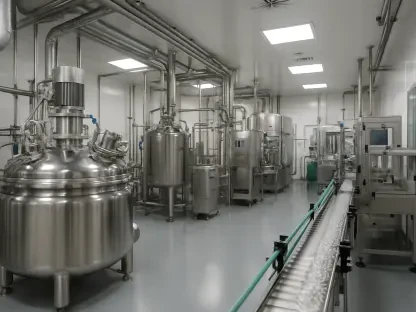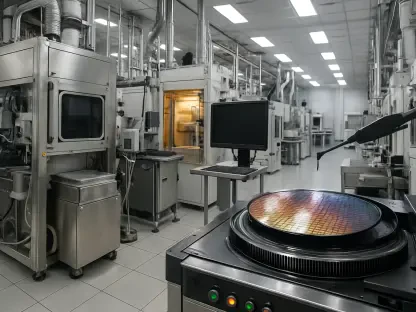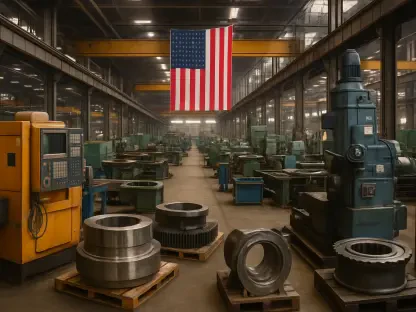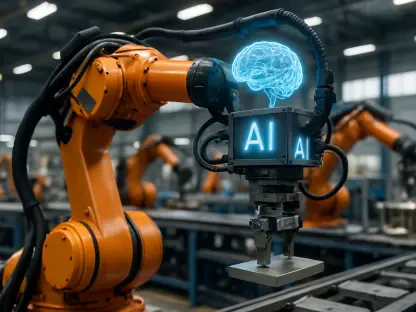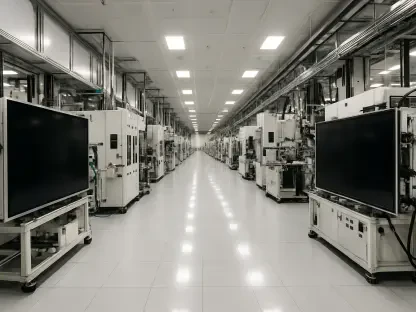Digital transformation is fundamentally reshaping the manufacturing landscape, propelled by innovative technologies and an unwavering commitment to sustainable practices. Companies are increasingly adopting advanced solutions such as the Artificial Intelligence of Things (AIoT), predictive maintenance protocols, smart buildings, and cloud-based electronic data interchange (EDI) systems. These tools not only enhance operational efficiency but also significantly reduce environmental impact. This ongoing transformation signifies more than the mere integration of new technologies; it represents a strategic maneuver to create more resilient and sustainable business practices.
Advancing Manufacturing with AIoT
The convergence of Artificial Intelligence (AI) and the Internet of Things (IoT), commonly known as AIoT, is revolutionizing manufacturing processes. By linking IoT devices capable of capturing extensive data with AI systems that analyze this data, manufacturers can streamline operations and elevate productivity.
AIoT enhances operational safety by predicting potential failures or hazards before they occur. This preemptive capability means issues can be addressed proactively, reducing unplanned downtime. Additionally, AIoT assists in optimizing resource allocation and ensuring efficient use of raw materials, resulting in cost savings and minimized waste.
Predictive maintenance, a key benefit of AIoT, stands out for its ability to foresee mechanical failures. Utilizing machine learning algorithms, these systems can convert vast amounts of data into actionable insights. This method has proven to substantially cut down on maintenance-related expenses, ensuring machines run more reliably and with less interruption.
Predictive Maintenance for Enhanced Reliability
Predictive maintenance leverages advanced data analytics and AI to predict equipment failures before they happen. This proactive approach helps manufacturers schedule maintenance activities at the most opportune times, thus avoiding costly unscheduled downtimes and extending the lifespan of machinery.
Implementing predictive maintenance solutions involves integrating sensors and data capture devices across the factory floor. These devices continuously monitor the condition of machinery, gathering data on variables like temperature, vibration, and noise levels. AI algorithms then analyze this data to identify patterns indicative of potential failures.
With accuracy rates exceeding 99%, AI-driven predictive maintenance ensures high reliability and operational efficiency. The significant reduction in unexpected breakdowns translates to smoother production processes, contributing to better overall performance and customer satisfaction.
Smart Buildings: A Path to Sustainable Manufacturing
Smart building technologies are becoming integral to sustainable manufacturing by addressing energy efficiency and waste reduction. These technologies encompass a wide range of solutions, from intelligent lighting and heating systems to comprehensive energy management platforms.
Incorporating smart buildings into manufacturing operations aids in monitoring and controlling energy consumption. It allows facilities to optimize their use of resources, reducing energy waste and lowering carbon footprints. For example, automated lighting systems adjust based on natural light availability, ensuring minimal energy use.
Moreover, smart buildings contribute to achieving zero waste to landfill goals. By integrating waste management systems, manufacturers can significantly reduce their environmental impact, ensuring adherence to stringent regulatory standards and bolstering their commitment to sustainability.
Cloud-Based EDI Solutions: Enhancing Agility and Security
The evolution of Electronic Data Interchange (EDI) towards cloud-based platforms has brought about significant benefits for manufacturers. Cloud-based EDI solutions offer greater agility, allowing businesses to respond swiftly to market shifts and operational demands.
Traditional EDI systems are often rigid and complex, leading to inefficiencies. In contrast, cloud-based EDI enables seamless data exchange, enhanced accuracy, and robust security measures. It supports real-time data synchronization across the supply chain, fostering better collaboration among stakeholders.
The agility provided by cloud-based EDI translates to faster onboarding of trading partners, expedited document exchanges, and streamlined order processing. As a result, manufacturers can achieve greater operational efficiency, reduce error rates, and enhance customer satisfaction.
Post-Election Business Strategies for Resilience
As businesses anticipate potential changes following the 2024 U.S. presidential election, the focus should be on resilience and agility. Manufacturers need to prepare for various scenarios, from shifts in trade policies to new regulatory standards.
Building resilience involves diversifying supply chains to mitigate risks associated with geopolitical changes. Manufacturers should explore multiple sourcing options and invest in local suppliers to minimize dependency on international trade routes, ensuring continuity despite potential disruptions.
Adopting advanced ERP systems also plays a crucial role in enhancing business agility. Mid-sized manufacturers, in particular, must seek ERP solutions that offer comprehensive service and cost efficiency. These systems enable better resource management, streamlined operations, and quicker adaptation to changing market dynamics.
Collaborative Efforts in Driving Innovation
Public-private collaborations are pivotal in advancing technological innovations within the manufacturing sector. Partnerships between academia, industry leaders, and tech companies foster a collaborative environment where cutting-edge solutions can flourish.
Institutions like Carnegie Mellon University and the University of Pittsburgh, in collaboration with NVIDIA, exemplify such efforts. Their joint technology centers focus on propelling AI advancements, benefiting various sectors, including manufacturing. These partnerships not only advance research but also provide practical applications that drive industry growth.
By leveraging the expertise and resources from multiple stakeholders, these collaborations enable the development of innovative solutions that address complex manufacturing challenges. Such initiatives ensure the sector stays at the forefront of technological advancements, maintaining competitiveness on a global scale.
Sustainable Manufacturing: Repurposed Robots and Energy Efficiency
Digital transformation is radically changing the manufacturing industry, driven by cutting-edge technologies and a firm dedication to sustainable practices. Manufacturers are increasingly implementing advanced solutions such as the Artificial Intelligence of Things (AIoT), predictive maintenance protocols, smart buildings, and cloud-based electronic data interchange (EDI) systems. These innovations not only boost operational efficiency but also considerably lessen the environmental footprint of manufacturing activities.
This ongoing transformation goes beyond merely adopting new technologies; it embodies a strategic approach to cultivating more resilient and sustainable business models. By embracing these advanced tools, manufacturers can predict and mitigate issues before they arise, optimize energy use, and streamline communication within supply chains. This shift is crucial for creating a future where manufacturing is not only more efficient but also more sustainable. The integration of such technologies is increasingly essential for the survival and growth of companies in this ever-evolving landscape, ensuring they remain competitive and sustainable.



